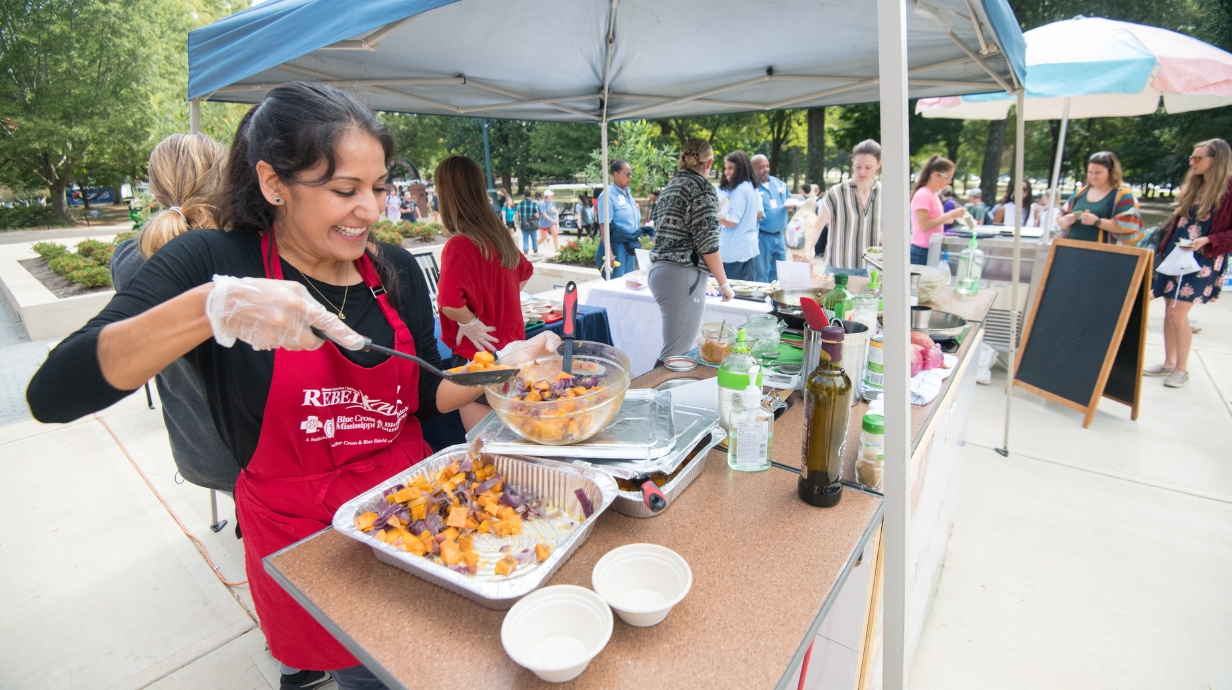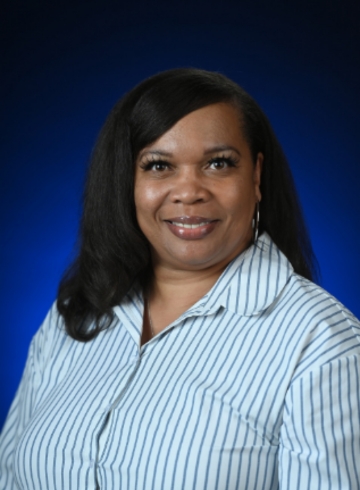Bachelor of Science in Dietetics and Nutrition
The Dietetics and Nutrition program prepares you for a career as a registered dietician, nutrition professional, or provides an excellent foundation for careers in other health-related professions.

About this Program
The Bachelor of Science in Dietetics and Nutrition trains students for careers in a dynamic profession and with endless possibilities for career advancement.
- Students learn how to apply the principles of science and food preparation to provide safe, evidence-based dietary advice and management to individuals (in health and disease), as well as to institutions.
Graduates of the Ole Miss dietetics degree become registered dietitians and provide nutritional care and counseling in:
- Schools
- Hospitals
- Nursing homes
- Community health programs
- Fitness centers, AND
- The food industry
Regardless of career choice, dietitians are recognized as the professional link between nutrition and health.
On this Page…
Program Information
Program Type
Major
Minor
Area of Study
Health and Social Services
School
Duration
4 years
Degree
B.S. in Dietetics and Nutrition
Program Location
Emphases
Dietetics ;
Child-Nutrition;
Health Sciences
Required Credit Hours
120
Dietetics and Nutrition Coursework
Students pursuing a B.S. in Dietetics and Nutrition must take Bisc 102/103 OR 160/161 OR Bisc 206 to fulfill the "Human Biology w/Lab." Students must also take Bisc 210 OR Bisc 333 for the "Additional Science w/Lab" requirement.
An additional 20 hours are required in the following courses:
- Chem 105/115
- Chem 106/116
- GB 370
- Spch 102, 105 OR IMC 585 OR Bus 271
- Writ 250
All B.S.D.N. students require the following 23 hours of credit:
- NHM 111: SERVSAFE
- NHM 114: An Introduction to Health Professions
- NHM 211: Introduction to Culinary Science
- NHM 213: Introduction to Culinary Science Lab
- NHM 311: Nutrition
- NHM 410: Fundamentals of Nutrition Assessment
- NHM 414: Professional Development in Nutrition
- NHM 415: Research in Culinary Science
- NHM 511: Advanced Nutrition
- NHM 531: Community Nutrition: Theory and Application
- NHM 532: Nutrition Education and Counseling: Theory and Practice
The nutrition minor is designed to provide evidence-based nutrition information to a broad student audience to enhance students' knowledge of nutrition and provide a nutrition foundation to benefit their future careers.
The minor consists of a 6-hour core and 12 hours of suggested electives based on nutrition interest areas.
6 hours core courses:
12 hours selected from the following courses:
- NHM 319: Sports Nutrition
- NHM 373: Consumer and Food Economics
- NHM 412: Nutrition Therapy and Pathophysiology
- NHM 511: Advanced Nutrition
- NHM 522: Nutrition Policy
- NHM 468: Nutrition/Hospitality Mgmt Study Tour**
- NHM 531: Applied Experiences in Community Nutrition
- NHM 532: Applied Experiences in Nutrition Counseling & Education
- NHM 493: Individual Group Study**
- Hon 402: Senior Honors Research (only students in Honors College (max 3 hours))
**By NHM department chair approval only (max 3 hours)
The nutrition minor has suggested paths for electives for students interested in specific areas. Please note these interest areas will not print on the transcript or diploma. Only the title of the minor will appear.
Suggest Electives - Clinical/Health Care:
The courses below would benefit students who are interested in working in a health profession that provides direct patient care.
- NHM 319: Sports Nutrition
- NHM 412: Nutrition Therapy and Pathophysiology
- NHM 511: Advanced Nutrition
- NHM 532: Applied Experiences in Nutrition Counseling & Education
- NHM 493: Individual / Group Study (by NHM department chair approval only (max 3 hours))
- Hon 402: Senior Honors Research (only students in Honors College (max 3 hours))
Suggested Electives - Nutrition Policy:
These courses would benefit students who are interested in careers related to health or health care, including (but not limited to) public health, health care administration, and health communications.
- NHM 373: Consumer and Food Economics
- NHM 522: Nutrition Policy
- NHM 531: Community Nutrition: Theory and Application
- NHM 493: Individual / Group Study (by NHM department chair approval only (max 3 hours)
- Hon 402: Senior Honors Research (only students in Honors College (max 3 hours)
The minor in food studies examines food from multiple perspectives. Core courses focus on an introduction to food studies, basic food principles, and cultural and economic aspects of food. Electives allow students to select courses that complement their academic and career interests, including food production and product development, food-related media and writing, food history and culture, local and global health, advocacy, and policy.
Required Courses (6 hours)
- NHM 101: Introduction to Food Studies (3 hours)
- NHM 211: Principles of Food (3 hours)
- NHM 111: SERVSAFE (1 hour)
- NHM 213: Principles of Food Preparation Lab (1 hour)
- NHM 268: Food, Culture, and Global Citizenship (3 hours)
- NHM 311: Nutrition (3 hours)
- NHM 373: Consumer and Food Economics (3 hours)
- NHM 415: Experimental Food Study (3 hours)
- NHM 417: Community Nutrition (3 hours)
- NHM 468: Nutrition/Hospitality Management Study Tour (no more than 3 hours)*
- NHM 493: Individual/Group Study OR NHM 593: Individual Study (1 to 3 hours)*
- NHM 522: Food Policy (3 hours)
- NHM 595: International Study Tour (3 hours)*
- Non-NHM food studies-related course (no more than 3 hours)*
- *NHM 468, 493, 593, and 595, as well as other NHM courses and non-NHM courses, must be food studies-related and requires prior approval by the director/department chair.
GPA of 2.0 or higher. C or better in all minor coursework.
Students enrolled in the Child Nutrition Emphasis must take the following additional courses (30 hours):
- ACCY 201: Introduction to Accounting Principles I (3 hours)
- GB 350: Essentials of Marketing (3 hours)
- ECON 202: Principles of Microeconomics OR ECON 203: Principles of Macroeconomics (3 hours)
- NHM 309: Menu Planning and Analysis (3 hours)
- NJM 310 Hospitality Industry Accounting (3 hours)
- NHM 328: Child Development (3 hours)
- NHM 441: Food Systems Management and Leadership (3 hours)
- NHM 469: Orientation to Child Nutrition Management (3 hours)
- NHM 522: Nutrition Policy (3 hours)
- NHM 533: Foodservice Management: Theory and App (3 hours)
The Dietetics Emphasis is an accredited Didactic Program in Dietetics by the Accreditation Council for Education in Nutrition and Dietetics (ACEND).
Students enrolled in the Dietetics Emphasis must take the following additional courses (29 hours):
- BISC 207: Human Anatomy and Physiology II (4 hours)
- CHEM 221/225: Elementary Organic Chemistry I w/ lab (4 hours)
- CHEM 271: Biochemical Concepts; OR CHEM 373: Intermediate Biochemistry; OR CHEM 471: Biochemistry I (3 hours)
- NHM 309: Menu Planning and Analysis (3 hours)
- NHM 412: Nutrition Therapy and Pathophysiology (3 hours)
- NHM 441: Food Systems Management and Leadership (3 hours)
- NHM 522: Nutrition Policy (3 hours)
- NHM 533: Foodservice Management: Theory and App (3 hours)
- NHM 534: Medical Nutrition Therapy: Theory and App (3 hours)
Students enrolled in the Health Sciences Emphasis must take the following additional courses (32 hours):
- BISC 207: Human Anatomy and Physiology II; OR BISC 330: Introductory Physiology (4 hours)
- CHEM 221/225: Elementary Organic Chemistry I w/ lab (4 hours)
- CHEM 271: Biochemical Concepts; OR CHEM 373 Intermediate Biochemistry; OR CHEM 471: Biochemistry I (3 hours)
- ES 396: Allied Health Terminology OR CLC 201: Medical Terminology in Greek and Latin (3 hours)
- PH 203: First Aid and CPR (3 hours)
- NHM 412: Nutrition Therapy and Astrophysical (3 hours)
Nutrition & Dietetics
Both the B.S. in Dietetics and Nutrition program and the Coordinated Program (CP) in Dietetics program at the University of Mississippi are accredited by the Accreditation Council for Education in Nutrition and Dietetics (ACEND) of the Academy of Nutrition and Dietetics (AND)
What does Dietetics and Nutrition look like in the job market?
Median income for Dietitians and Nutritionists in 2022
Jobs for Dietitians and Nutritionists in 2022.
Careers in Nutrition and Dietetics
- Dietitian
- Food Safety Auditor
- Nutritionist
- Health Coach
- Sports Nutritionist
- Nutrition Writer
- Dietetic Technician
- Clinical Nutritionist
Stay up to date with Dietetics and Nutrition at UM!
Follow us on Instagram to stay in the know.
View this profile on Instagram

We’re here for you!
We are here to answer any questions you may have about a degree in NHM.
Tameka Johnson
Coordinator for Advising, Recruitment, and Retention
Next Steps
Explore Affordability
We have a variety of scholarships and financial aid options to help make college more affordable for you and your family.
Apply to the University of Mississippi
Are you ready to take the next step toward building your legacy?


